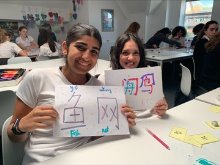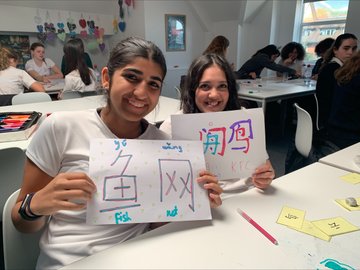#SchoolStories
See our latest stories and follow us on social media

The art of translation, sign language, make your own Hanzi 汉字 (Chinese characters), poems in translation, invented languages and language puzzles... All these were on offer at the WHS inaugural Linguistica Languages conference!
The conference on Thursday 18th May, which brought together students from Wimbledon High and Harris Academy Wimbledon, kicked off with keynote speaker, author, journalist and numbers enthusiast, Alex Bellos. Alex treated audiences to A Brief History of the Alphabet, telling the story of writing systems, and the emergence of the alphabet - a story that began with numbers and took us through to the present day.

Lucille (Y12) explains further:
“During our Linguistica Conference, we had the pleasure of hearing from our keynote speaker Alex Bellos. “The Language Lover’s Puzzle Book” is his new book in celebration of language and languages told through puzzles. It is a way of expanding our knowledge in a fun way, with a bit of a challenge as well. By combining puzzles and language, he has allowed us to understand the similarity between different languages all over the world and how each were influenced from one another. He talked to us about a range of different time periods and cultures, from the alphabet of the Cherokee to Egyptian hieroglyphics and Old Persian cuneiform to modern day Danish. He gave us the ability to decipher the meanings of words or drawings from hundreds of years ago by using our own current knowledge and patterns we can observe through puzzles. We all attended because of our own love for languages, but I don’t think we knew that the modern languages we study now, originated and evolved with such amazing stories. A quote from his book that explains the meaning of the talk perfectly is” “And it sparks wonder, by revealing diverse ways that people approach even the most basic things.”
Olivia (Y12) adds: “Throughout the talk, Alex Bellos narrated the evolution of the alphabet from Egyptian Hieroglyphs to the English alphabet as we know it today. We guessed meanings of hieroglyphs as he explained how the Phoenicians simplified the extensive Egyptian characters to 22 letters. He spoke about how important this simplified version was, as the Phoenicians were heavily involved in trading, and the merchants and traders wanted a language that would not be difficult to learn and would be quick and easy to use. You can even see the influence of the Phoenician alphabet today, as it is written from right to left like modern day Hebrew and Arabic. During Alex Bellos’ childhood, he grew up speaking a range of languages including Hungarian and French, and later travelled to Brazil, and as he worked in journalism, he became fluent in the native language in 3 months. He went on to write ‘Futebol: The Brazilian Way of Life’ which encapsulates the Brazilian culture through the lens of football, which was later nominated at the British Book Awards and the National Sports Book Awards.”
The keynote was followed by an array of interactive workshops, attended by both schools. Here are the reflections of two Wimbledon high participants:
“I chose the Sign Language workshop to help reduce the number of people excluded due to their inability to communicate in a manner deemed 'normal' in society. We learnt the alphabet and some conversation starters and key words. This workshop has enabled me to comfortably communicate with people who are deaf and was particularly interesting, yet challenging, to try and converse with my friends without talking whatsoever.”
Naina (Y10)
“I chose the workshop ‘Grow Your Own Poem’ because I was really interested in exploring just how accurate Google Translate is- throughout school, students are so regularly told not to rely on Google Translate, surely there has to be a reason? With poems especially, the meaning of literature can be easily warped, as metaphors and idioms are often lost in translation, so investigating this seemed interesting. We began by getting into groups with the Harris students and picking a poem we liked. Then, we typed the poem into google translate, put it into another language (we chose Finnish), and then translating it back into English, and comparing it to the original poem. Our expectations were low, but surprisingly, the translation wasn’t too far off; a few funny lines, but other than that, fairly accurate. We came to the conclusion that over the past 5 years, Google Translate has really improved. Something I really enjoyed about the workshop was the freedom we had in picking the poems and which language we chose to translate into- it was fascinating to see how the degree of accuracy of the poems varied based on the language they were translated into.”
Dilly (Y10)
Thank you to all those who ensured it was such a great success!






